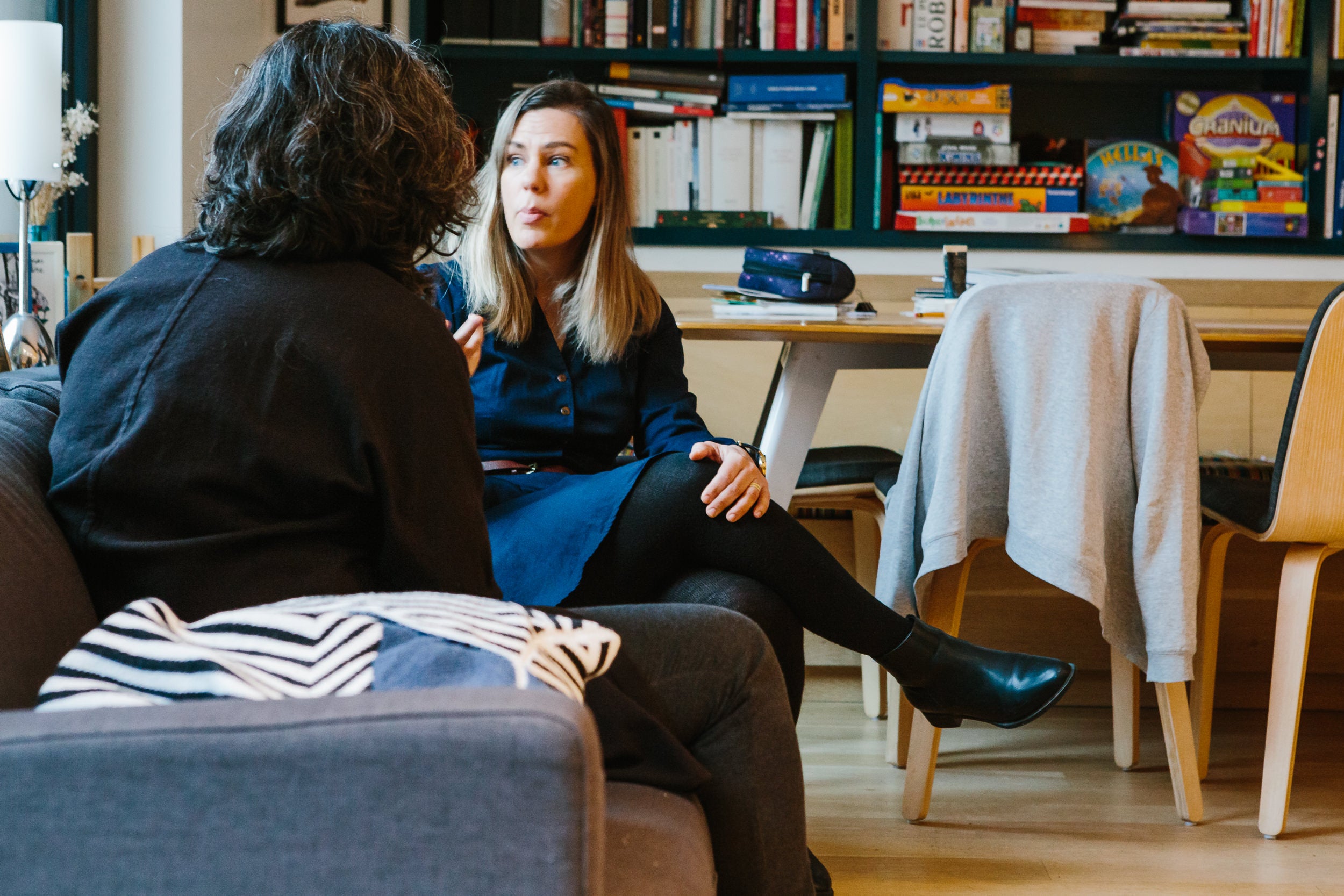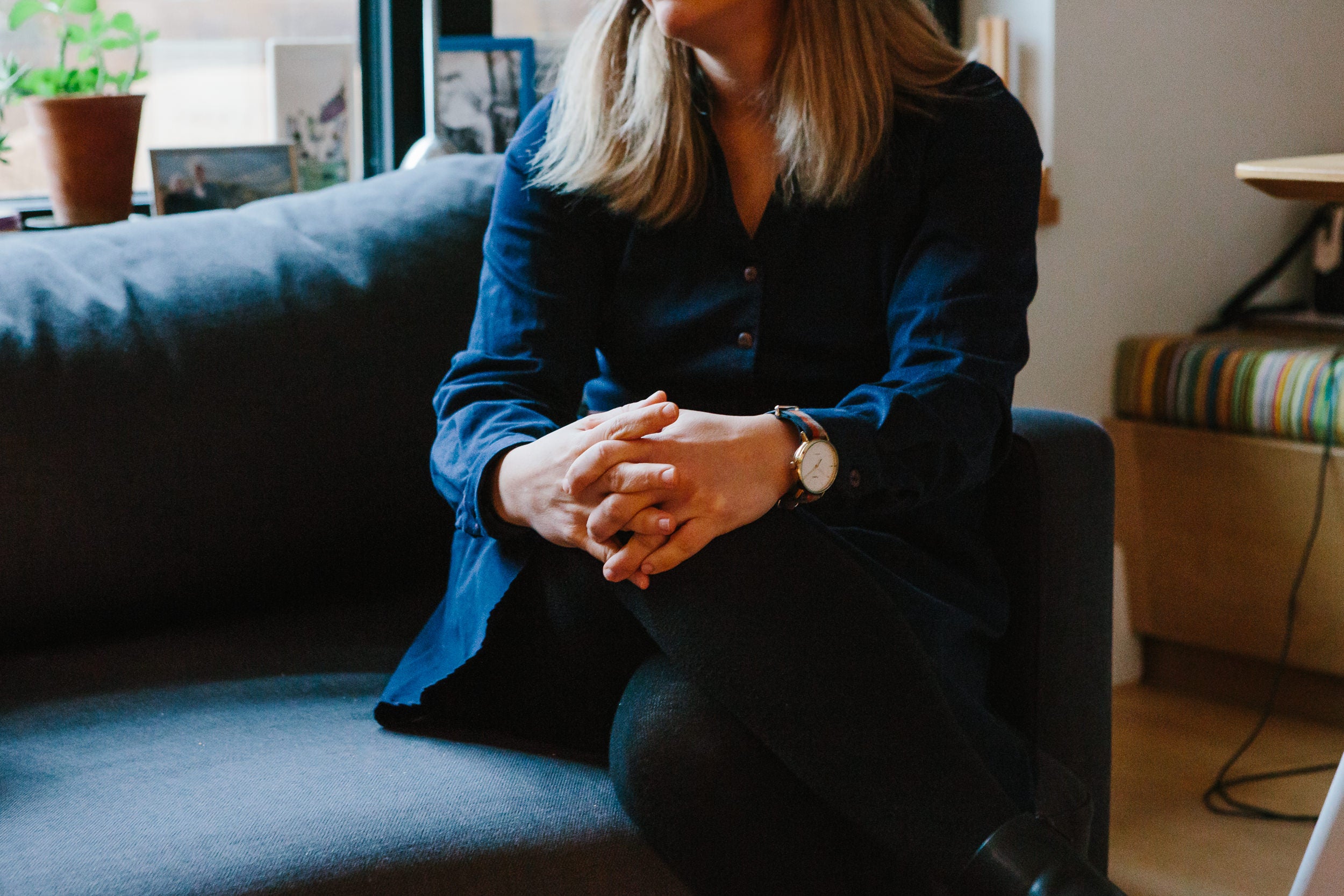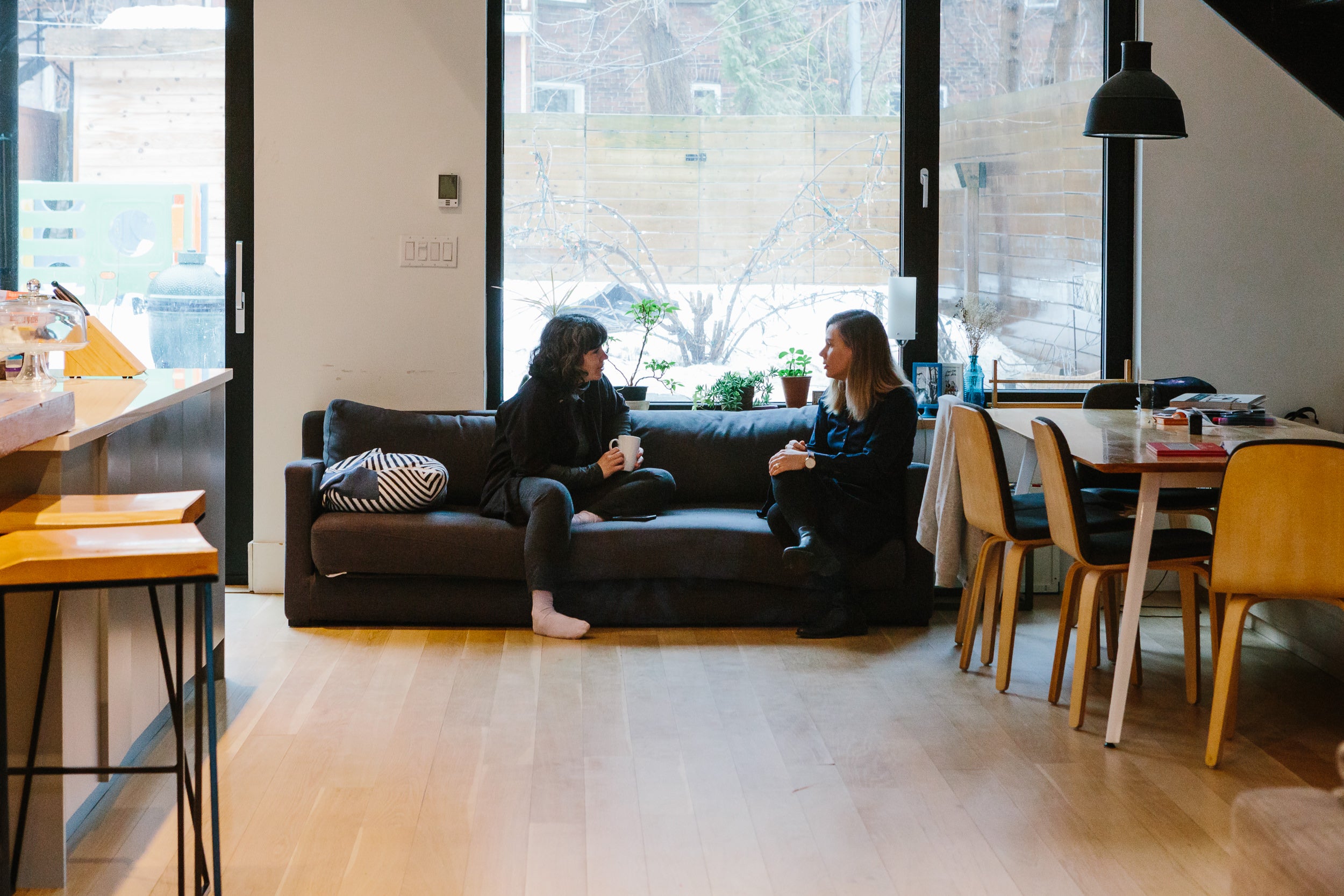
Here we present a series of portraits of clients who inspire us with their social involvement and uniqueness. These fascinating people have little presence on social networks, they are discreet, they act quietly, almost in the shadows. They are people of action who make a difference and we have them in mind when we create our collections. We are happy to share with you these discussions captured in images by Marie-Ève Campbell of Atelier Camion. She is the one who launched this project idea and we are delighted to see it come to life. Here is the first portrait, that of a lawyer in humanitarian law and mother of two boys aged 7 and 10. She spoke to us about privilege, humanity, kindness and... pandemic.
---
Sophie has been a client of atelier b since the opening of the Mile End boutique. She lives a few steps away with her family and we got to know her better when she responded to our invitation to join the atelier's book club in 2013. We met her at her home as we began to realize that the virus we were hearing about in the news was becoming a pandemic. It was a rainy morning and we could already feel a cloud of anxiety closing in on us. I had prepared some questions related to her background and values, but the discussion quickly shifted to her expertise in international law to discuss global measures relating to Covid-19.

Writing a doctoral thesis ... in confinement ...
I'll start by asking Sophie what she does all day. Following her Bachelor of Laws, her Bar and her Master's degree, Sophie is now in the process of obtaining her PhD. "When you're in writing, it's for better or worse," says Sophie, "you're in your pajamas at home writing." Her thesis, co-supervised with the University of Geneva (the mecca of humanitarian law) and Laval University, focuses on the law of war. Most of the rules governing this law come from international conventions. Perhaps you have already heard of international criminal tribunals? Sophie is studying whether their decisions make a difference in terms of law.

Writing a doctoral thesis... with children...
Both a mother and a researcher in a research centre affiliated with UQAM, it's not easy to find the time to write. "Often, at the thesis, you can spend seven or eight hours writing without sleeping, eating and drinking coffee," explains Sophie, "I don't have that option and I've noticed that it's a big drag." That being said, she likes to do her thesis with children. "It gives a lot of meaning to your life, it helps you put things in perspective, but it's harder." If her role as a parent nourishes her writing, the same is true of her other occupations, a phenomenon she calls "mutual fertilization". Although these children don't quite understand what she is doing, they do understand that she is writing a big book that is not fiction, about rules of law. "Mommy likes to read, she likes to write... That's actually pretty good!" Our meeting was also punctuated by the visits of his youngest, Felix, who came down to listen to us or launch a classic "maman j'ai faim".

Parallel paths
Sophie may enjoy reading and writing, but she also has a deep attachment to improvisation, theatre and dance. While she was following a rather typical study path in law, she didn't hesitate to turn to more artistic extracurricular activities. "I did dance for 15 years, I did improvisation in high school, then in CEGEP, and I really liked theatre," says Sophie. Why did she choose to study law rather than a creative field? "I chose law because it was very limited and I was proud to have been chosen. I wanted to take the path where it was most difficult."
Failure is relative
One of the things we admire most about Sophie is certainly her ability to face adversity with a constructive attitude. When asked about the failures that have marked her path, she says she has not experienced any. "I've always considered myself to be hyper privileged. I'm surrounded by positive people, even when things go wrong." Being a young, educated, French-speaking white woman, she sees with age how pampered she is. Especially since, in human rights law, she lives with marginalized people who have had less luck in life. "What do you think is failure for me? Not getting a grant?" Being humble is an essential part of her work.
So how would she define perfection if she doesn't believe she has experienced real failures in her career? "Experience combined with a critical sense," answers Sophie. "When you're able to step back, take a critical look at what you've done and build on that experience." For Sophie, that's perfection.

Civil rights in times of pandemic
The interview took place the first time schools were closed because of Covid-19. So I couldn't pass up Sophie's expertise, and I asked her how a global pandemic and rights were connected. Right to assembly, freedom of expression, access to housing for vulnerable people: civil rights are fundamental in a society. During a pandemic, as Sophie explains, the state can use this excuse to limit fundamental rights. Of course, the risk of slippage is higher in repressive countries such as Iran or China, but other authoritarian governments may seek to take over in a crisis situation. "You have to be very careful not to allow these kinds of excesses," worries Sophie.
Access to health care for all
Another source of concern for the humanitarian lawyer is the saturation of the healthcare system. Will we be able to care for all the patients with Covid-19? That's a disturbing question to ask. All the more so since, as the pandemic progresses, vulnerable people (the elderly, racialized women working in care settings, large families in precarious economic situations, etc.) are increasingly affected. It should be remembered that the first infected people, often returning from a trip, and therefore very often privileged individuals, benefited from a health system that was not yet saturated as there was no local contagion. Today, the people infected with Covid-19, contaminated by the first ones, are more numerous and come from less privileged backgrounds.
International health
Due to the nature of Sophie's work, we took the opportunity to ask her questions about procedures within international organizations in the event of a pandemic. Can the United Nations impose rules on member countries? In short, no. The World Health Organization (WHO) develops mechanisms, but it cannot impose them. For example, the WHO developed guidelines for states following SARS and Ebola. That being said, although countries are not required to follow them, many do so because it is beneficial. "International law is about coordination," says Sophie, "you can't impose rules, but everybody can try to work together."
Helping the vulnerable
The virus does not discriminate: it has the potential to infect any human being, regardless of social rank. However, it poses greater risks for people who are already in vulnerable situations, such as the homeless. Sophie knows this as she sits on the board of directors of L'Itinéraire, which is made up of a parity mix of five camelots with field experience and five outsiders who deal with management and development. Unfortunately, with the pandemic, people who are homeless are more stigmatized as they live in public places. "Our camelots have their health at heart and L'Itinéraire is there for them. With the containment measures, magazine sales, which are done on the street or in the metro, have therefore been suspended. But times are uncertain, so we're working hard to build on that and continue to support marginalized people, those who are excluded from the traditional job market, who have experienced homelessness, addiction, or who suffer from mental health problems. That will be even more essential in the coming years. ”

Doing what's necessary
Basically, for Sophie, the crisis confronts us with the reality that what we do is not always necessary. The course loads she had at the Faculty of Law and the Université de Sherbrooke, or the lectures she gave everywhere, have nothing to do with the sacrifices of health care personnel. Nor does her confinement have anything to do with what other populations experience elsewhere. In the midst of writing her doctoral thesis, she admits that she is now able to devote herself body and soul to it while staying warm in her house in Mile End, with enough food and water. In the South or even closer to home, on Aboriginal reserves, many people do not have access to running water to wash their hands or stay hydrated, she reminds us.
We concluded the meeting by discussing our upcoming social and cultural activities, wondering which ones would take place and which ones would be cancelled. We didn't know what the next few weeks had in store for us!
Thanks to Maryse Boyce for the transcript and the interview. Thanks to Elisabeth Labelle for the writing. Thanks to Marie-Eve Campbell for the beautiful photos. Thanks to Sophie for her generosity.

